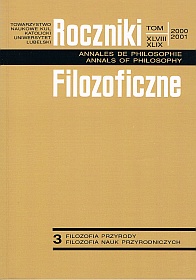Historical and Philosophical Context of Edward Arthur Milne’s Cosmology
Abstract
This is a two-part paper. The first part describes the direct influence of five philosophical assumptions adopted by Milne, which shaped up his Kinematic Relativity and cosmology theories. The first three of his assumptions were of epistemological nature: deductive method of constructing a scientific theory; gaining „insight into phenomena”, and a simplicity postulate (cosmological principle). The two latter ones were of ontological nature; they related to problems of time and space.
The second part of this paper deals with Milne’s own critical judgment of the basis of general relativity, which was deeply rooted in his philosophical assumptions. Especially heavy criticism fell on the simplicity postulate, which directly or indirectly led to the following: 1) rejection of curved space and choosing Euclid’s version, 2) criticism of a nonsensical, according to Milne, notion of „expanding space”, 3) non-acceptance of close correlation between space and matter, 4) adoption of his own idea of time and space and, as a result, rejection of notion of space-time, 5) rejection of General Relativity because of too complex mathematical equations.
Milne did not stop at criticising Einstein’s theory, but also undertook the task of constructing his own theory, totally opposed to the General Relativity. It so happened therefore, that his philosophical assumptions became foundations of a new, original natural theory, which should have - according to the view of its author - indicated a better way to build a physical knowledge and a more efficient way to understand the Universe.
Copyright (c) 2001 Roczniki Filozoficzne

This work is licensed under a Creative Commons Attribution-NonCommercial-NoDerivatives 4.0 International License.





